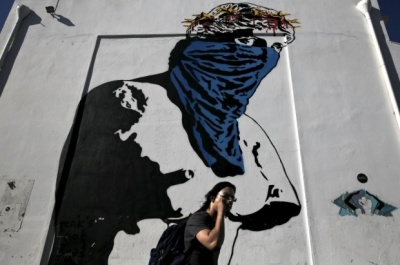Ladies and gentlemen…
The Memorandum was not just an economic mistake, a bad program, an oversight.
It was a conscious choice to place the burden of the economic crisis caused by the imbalances in the financial system and worsened by the inherent pathologies of the Greek state and the Greek economy, onto the backs of laborers, pensioners, the self-employed middle class and small entrepreneurs.
In reality, the Memorandum was nothing more than an effort to overcome the crisis by enabling an unprecedented liquidation of rights and businesses that would create the basis for a new capital accumulation with significantly worse terms for the social majority.
It was, of course, a given that this policy would lead to an extended recession that was considered desirable initially by the creators of the Memorandum.
They were well aware of what they were doing and despite this fact, they went ahead.
This is the formula of their absolute cynicism.
During the years of the Memorandum, social inequalities in Greece soared – Greece places first on the social inequality index in Europe – unemployment tripled, wages sunk, pensions suffered dramatic cuts and the welfare state literally collapsed.
The only ones who did not sustain damage during this five-year period were the wealthy Greeks.
According to a study by Credit Suisse, 10% of the wealthiest Greeks currently manage at least 56% of the national wealth.
This political and economic storm left only one thing standing: The clientelistic and corrupt state that supported the political and economic elite of this country.
Or to be exact, not only was it left standing, but it also allowed for even worse practices to take root.
None of the alleged Memorandum reforms improved the tax collection mechanism, which is now collapsing despite the eagerness of some enlightened and justifiably nervous employees.
No alleged reform fought the triangle of corruption between the political elite, media owners and Banks.
No reform has improved the functioning and effectiveness of a state that has learned to operate by serving special interests rather than the common good.
It was precisely this situation, namely the inability to justify this extreme policy, the inability to put forward a convincing discourse that would transform the self-serving interests of the elites into the interests of society as a whole, which brought SYRIZA and the anti-memorandum block to power.
Because you can fool many people for a short time and a few people for a long time,
But you cannot fool all of the people all of the time.
Ladies and Gentlemen,
The elections on January 25 gave a clear mandate to this government of social salvation and economic reconstruction: To change the Memorandum policy that destroyed Greek society and brought it to the brink of despair.
The new government has a completely different point of view regarding how the Greek economy and society should be organised.
An entirely different understanding of the preconditions required to achieve sustainable growth that will reduce inequalities, rather than increase them.
Because if growth is simply a continuation of the existing state of affairs, allowing the social gap to remain intact or even exacerbating social divisions, then something is fundamentally wrong with the “kingdom of Europe.”
Therefore, it is this mandate that we have been implementing during the first one hundred days in office, and it is this new point of view that we highlight in the public debate across an ageing Europe.
We are legislating and negotiating in the name of the greater social majority that supports us, and in the name of social justice, growth and the promotion of equality.
Because equality is one of the cornerstones of United Europe that should not be allowed to be eroded by those who insist on speaking only in the name of liberty, forgetting the precondition that makes liberty for all possible:
And what else could this precondition be equality?
We therefore legislate and negotiate, guided by the compass of the interests and aspirations of this social majority: the employees and the middle class that were socially and ethically crushed in the four years of the Memorandum’s assault.
And our goal is to once again construct a version of social justice that will transform Greek and European society from a sum of individuals to a real community.
Our goal is to restore the true meaning of politics in order to achieve our ultimate objective, which we all share:
A sustainable version of social interest that will not create tensions and but will encourage people’s potential by providing the opportunity for well-being.
However, we are legislating and negotiating in an unprecedentedly difficult economic environment.
We are walking through a mine-filled territory prepared by the supporters of the Memorandum from the previous government.
It is common practice for those voted into power to say that they’ve inherited “scorched earth.”
But in our case, this wouldn’t qualify as an exaggeration but rather, as a moderate comment.
We haven’t simply inherited scorched earth.
We’ve inherited a country completely unable to function.
We’ve inherited a country unable to pay wages and pensions just one month after the elections, i.e. in February 2015, and resulting from the previous government.
And yet, we’ve managed to keep the country afloat.
We’ve managed to fully ensure the proper functioning of the responsibilities of the State, while simultaneously engaging in a difficult negotiation.
And despite the financial pressures, our citizens’ confidence has increased, which is why a significant revenue growth in public funds has been recorded.
In the four months that our government has been in office, the primary surplus has reached €2.164 million Euro compared to a primary surplus of €1.046 million Euro for the same period in 2014, and in contrast to a primary deficit forecast of €287 million Euro.
In the month of April alone we increased the net revenues of the ordinary budget by 15.3% against the monthly target.
In doing so, not only did we avoid the previous government’s deliberately set up “crash” scheduled for February, but we also fulfilled the repayment of all internal and external liabilities of the country without risks, despite the fact that no loan instalment has been disbursed since August 2014.
And I want to assure you that there is no threat to salaries and pensions.
There is, however, a major issue here, which I’d characterize as a moral issue.
The agreement has to be finalized, and it should be honest and mutually beneficial.
It is unacceptable for some to think that as time passes the endurance of the Greek side will be tested and that its red lines will fade.
If they have this in mind they should forget about it, as the very opposite will occur.
Since August 2014 we have not received the instalment of 7.2 billion from our lenders, in accordance with the current lending program.
This also includes the 1.9 billion Euro in profits from the central banks that resulted from Greek bonds.
And the 1.2 billion Euro in bonds paid with funds from our budget and that were transferred from the FSF to the ESM.
However, during this time, while we are not receiving the funding that we should be receiving, we have paid instalments of 17.5 billion to the same institutions.
If some believe that this is legal, I can see their point of view.
They will claim that the law is on the lender’s side.
But whoever considers it moral–they are certainly not impartial.
Ladies and gentlemen,
There are several members of the opposition who are deeply frustrated because they cannot express enough political criticism, reproaching us that we have allegedly forgotten our commitments made prior to the elections and that we have back-pedaled on the Thessaloniki Program’s agenda.
Instead of answering, I will summarize what the government has done in the first hundred days, and let the facts speak for themselves:
More specifically therefore:
Within the first one hundred days the government has:
- Taken the first steps in alleviating the humanitarian crisis through the first bill passed by the new Parliament: The program is being implemented on daily basis while being expanded to cover food, housing, electricity.
- Taken immediate steps to restart the economy and restore tax justice: The one hundred installments for the repayment of tax and social security liabilities of citizens are already underway, enabling hundreds of thousands of businesses to readjust their debts and to obtain tax and social security clearance and for thousands of households to escape the choke-hold of over-indebtedness….
- In addition, we voted on a provision, and a Ministerial decision was issued combating triangular trades, which puts an end to one of the most common tax evasion techniques.
- Furthermore, the first law for the democratization of public administration was voted on, which restores some of the blatant injustices that took place during the Memorandum period, such as the dismissal of the cleaners from the Ministry of Finance, the school guards and other public servants.
- The aspects of the program regarding employment recovery have commenced, and continue also through the initiative announced by President Juncker for the disbursement of funds from existing programs, totaling 2 billion Euro.
We are certainly facing difficulties, especially due the ineffective programs designed by the previous government that we are also bound to follow.
However, we will be able to alter and correct these programs in line with our agenda, as planned for the second half of 2015.
- The bill to reopen ERT (the public broadcaster—the Hellenic Broadcasting Corporation) was also voted on, which is a symbolic milestone. We’ve created the conditions for a new public broadcaster free of partisanship, political favors and the wasteful practices of the past. A public information body that will reflect the new public ethos and the democratic political culture of our government.
- We proceeded, as planned, with charging television stations with the operation fees due, more specifically, the matter of unpaid debts that have been pending—unaddressed—for years, while the draft law regarding the stations’ licensing is in the final stage.
- We’re consulting with the International Labour Organization on a bill to be voted on in the coming months, regarding the restoration of the European acquis on labor relations, the restoration of collective bargaining, the post termination effects and the gradual restoration of the minimum wage to 751 Euro….
- The Committee for the review of the Memoranda has commenced with its responsibilities.
- For the first time, the national demand for German reparations has been officially expressed at the highest possible level.
- Tax evasion suspects on the Lagarde list have been summoned to pay and settle their pending tax affairs—a first–while detailed checks are continuing on other cases.
- Special working groups are examining tainted past public agreements, such as the patently unfair out of court settlement between the Greek state and Siemens.
However, we are still just beginning.
We cannot simply forget and move on, doing away in one fell swoop with the negative forces of the past: corruption, poverty and dependence.
At the same time however, we are rigorously negotiating with the lenders on behalf of our people, our country, and for Europe, as well.
In the first days of the negotiation we were faced with the legacy of the Memorandum.
We were faced the requirement to complete the fifth assessment and to implement the commitments that the previous government had undertaken, as laid out in the oft-cited Hardouvelis email.
We demanded respect from our partners; respect for the rules of Europe and for the principle of popular sovereignty that is the cornerstone of the democratic organization of the European Union.
We fought for, and through the February 20 Eurogroup decision we achieved a shift in the attitudes of our lenders–from upholding the Memorandum to the letter, to searching for common ground based on our own priorities.
This is a decision that we respect.
But for a mutually beneficial solution, an agreement must be reached – and not one that leads to the same dead ends – all parties involved should keep this in mind.
The insistence on measures in accordance with the Memorandum, in addition to constant accusations that we are reneging on what was agreed upon with the previous government do not help the ongoing negotiation process.
The Greek government continues to negotiate to achieve a fair, economically and socially viable agreement with our partners.
An agreement that will end austerity, will restore liquidity to the real economy and will provide growth prospects for the country.
This requires:
- Low primary surpluses, especially for this year and for 2016, in order to stop the mechanism that is furthering austerity and to regain the necessary fiscal space.
- No new wage and pension cuts, i.e. measures that will intensify social inequality.
- Restructuring the public debt in order to end the vicious cycle of the past five years where the country has had to take new loans to repay the existing loans.
- A strong investment program, coordinated financing for investments, especially those regarding infrastructure and new technologies.
At this stage it seems that common ground has been found with the institutions on a number of issues and thus, we are very close to an agreement.
Common ground has been found on issues such as fiscal targets, the marginal VAT changes, which should function in a redistributive manner in favour of the lower classes, and institutional changes to strengthen the tax collection administration.
There are of course issues that remain open: Some are insisting on proposals for changes to the institutional framework that defines the operation of the already deregulated labour market.
These changes cannot be accepted.
The paradox is that while the same forces question the viability of the pension system, the insistence on the Memorandum prerequisites that entail cuts continues.
However, in the following days we must work hard to build the necessary common understanding in terms of the actual amounts of the social security system and ensure that any proposals and estimates will not be based on a false picture of the financial situation of the social security funds.
To be clear, I want to assure the Greek people that there is no probability or possibility of the Greek government backing down on the issue of salaries and pensions.
Employees and pensioners have suffered enough.
The time has come for redistribution, and for the fair sharing of burdens.
Ladies and gentlemen,
We are negotiating with persistence and determination for a single agreement, with uniform prerequisites, that will ensure growth and Greece’s access to the markets within a short time period.
This is the plan we are discussing.
Anything else will be a repetition of failed attempts and deliberate mistakes that some of the institutions have publicly admitted to in the past, in an effort to reduce social tension.
But for these public admissions to be credible, they should also be reflected in practice.
Our government’s negotiating plan is neither radical nor bold nor aggressive.
Our government’s negotiating plan is realistic and viable.
We call on the other side, after five consecutive years of unrealistic targets and continuous failures, to adhere to realism.



 rnment was established, it became clear – both domestically, and abroad – that the mandate given by the Greek people is binding and constitutes the compass for the negotiations. The “red lines” of the Greek government are also the “red lines” of the Greek people. They express the interests of the workers, self-employed, pensioners, farmers and the youth. They express the need of the country to embark on a new path of development, having at its core social justice and the redistribution of wealth.
rnment was established, it became clear – both domestically, and abroad – that the mandate given by the Greek people is binding and constitutes the compass for the negotiations. The “red lines” of the Greek government are also the “red lines” of the Greek people. They express the interests of the workers, self-employed, pensioners, farmers and the youth. They express the need of the country to embark on a new path of development, having at its core social justice and the redistribution of wealth.


